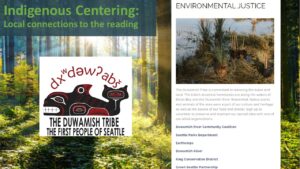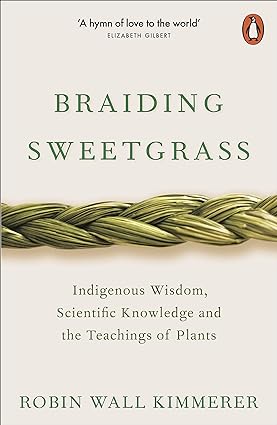Teachers in the Braiding Sweetgrass workshop shared that they had been wanting to read the book for years.
One of the rarest gifts a teacher can receive is time. Amid the relentless demand to deliver content, meet standards, attend meetings, manage behavior, and communicate with parents, opportunities to dive deeply into reflective practice or connect in meaningful ways with colleagues are scarce.
Which is why PEI’s recent extended workshop series was designed to lean into Robin Wall Kimmerer’s reminders to slow down and remember stories of abundance. From February to May, 25 teachers from Pierce, King, and Snohomish counties met virtually to discuss the principles and practices of Robin Wall Kimmerer’s seminal book Braiding Sweetgrass: Indigenous Wisdom, Scientific Knowledge and the Teachings of Plants and spend time planning to implement their learnings. “It felt like we were giving them a joyful experience of something many of them have been wanting to do for years- read this book,”says Lydia Geschiere, PEI’s East Sound North FieldSTEM Coordinator. “More cameras than usual were on, and they had time to get to know each other personally and plan together…there was a general sense of excitement.”
“We were building relationships through telling stories and sharing what we were thinking about. Some of the teachers even work at the same schools and mentioned talking about the book in the hallway or checking in about certain connections and stories. In that story-driven way, the process mirrored the principles in the book.” — Lydia Geschiere, PEI’s East Sound FieldSTEM Coordinator
Geschiere co-facilitated the course with Coastal FieldSTEM Coordinator John Hunter and Multicultural Engagement Coordinator Lourdes Flores. They all found the process as rejuvenating as the participants did.
“One of the things that makes it different from other workshops is that it extends over time,” says Hunter, who first encountered Kimmerer’s work nearly 40 years ago.
“Usually there isn’t much time to get a sense of who participants really are, but that developed in this workshop. And spending time with Lydia and Lourdes over three months allowed us to think creatively and come back to ideas.”
The team began each session by highlighting local tribal perspectives and resources related to themes encountered in each section of the book. One of the invited guest voices was Cinnamon Bear, an educator and traditional medicine herbalist who works as an education forester for ManulifeForest Management implementing programs for the Muckleshoot tribal community.

Cinnamon previously collaborated on developing PEI’s Solutions Oriented Learning Storylines, and introduced them to the teachers to explore during their planning time. In an additional session participant Sadrina Dorn led with her own Indigenous Honoring and taught her fellow teachers the stories that she uses in her classroom. An aim for following iterations of this book study is to increase the representation of Indigenous voices present at each session, as well as continue to share as many local regional Tribal perspectives as possible.
Teachers grew closer through sharing their implementation stories and ideas. “We were building relationships through telling stories and sharing what we were thinking about,” Geschiere notes.“Some of them even work at the same schools and mentioned talking about the book in the hallway or checking in about certain connections and stories. In that story-driven way, the process mirrored the principles in the book.”
Flores is confident that the teachers’ enthusiasm will translate to students as teachers put the concepts into practice. “They love to see the resources and learn how they can apply some of these ideas during the asynchronous part of the course,” she says. “It’s enjoyable reading the book, but they’re also thinking of their everyday lives as teachers. This should be equally interesting for students.”
Geschiere found the process of gathering resources of value in another way. “I’ve learned a lot from searching to find resources that are exemplifying respectful incorporation of indigenous ways of knowing,” she maintains. “This is not a checkbox. It’s a way of understanding the world that is valuable and essential for everyone to learn about and reflect on.”
